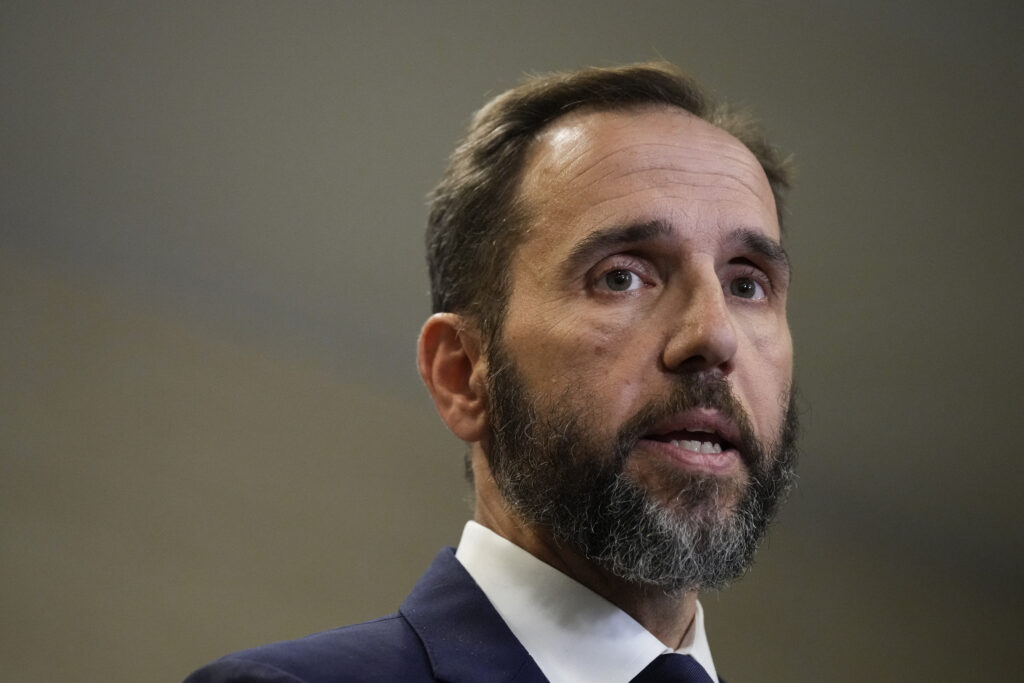Jack Smith’s Authority To Prosecute Trump Is on ‘Life Support,’ Republican States Argue
A collection of state attorneys general make the case for the high court to ‘pull the plug’ on the constitutionality of the appointment of Smith without confirmation by the Senate.

A new argument that Special Counsel Jack Smith holds his post unlawfully underscores how his Mar-a-Lago case against President Trump hangs by a thread — even if the 45th president loses the vote.
That case is being pressed to the 11th United States Appeals Circuit by 20 Republican attorneys general. They want that tribunal to uphold Judge Aileen Cannon’s ruling that Attorney General Garland’s appointment of Mr. Smith was defective.
Judge Cannon not only ruled that Mr. Garland lacked the statutory authority to hire Mr. Smith without confirmation by the Senate, she determined that his hiring was so defective that she dismissed the charges against Trump and his two co-defendants. Mr. Smith has appealed, and notes that special counsels have been used to prosecute the president of the Confederacy, Jefferson Davis, as well as some of the cabal that assassinated President Lincoln.
The Republican officials contend that Mr. Smith twice indicted the “principal political rival of the current ruling regime” even as he faces “next-to-zero presidential accountability” because he was not appointed by the president and confirmed by the Senate. The attorneys general accuse Mr. Smith of “pursuing arguably the most politically sensitive criminal prosecution in American history.”
The amici cite the Framers for the proposition that “supervising and controlling subordinate executive officers was itself an exercise of executive power belonging ultimately to the President.” That is because the Constitution vests all of the executive power in the president and commands that he — exclusively — shall “take Care that the Laws be faithfully executed.”
The attorneys general, though, write that the “avowed purpose of Special Counsel Smith’s appointment was to remove responsibility — and thus political accountability — for the investigations and prosecutions under his purview from the current Administration.” Mr. Garland named Mr. Smith to his post two days after Trump declared his intention to regain the White House.
The special counsel, the amici argue, is now “unilaterally” tasked with resolving “massively consequential, politically fraught issues like whether to indict a former president and current presidential candidate and what position the United States will take as to whether and to what extent a President enjoys immunity from criminal prosecution.” The Supreme Court in Trump v. United States held that official presidential acts are presumptively immune.
Mr. Smith argues that the possibility of special prosecutors was present from the moment the Department of Justice was founded in 1870. Its charter mandates that “the Attorney-General may, whenever he deems it for the interest of the United States, conduct and argue any case in which the government is interested, in any court of the United States.” All DOJ functions are “are vested in the Attorney General.”

The Supreme Court in United States v. Nixon appeared to endorse the position that the attorney general could appoint subordinate prosecutors. That is Mr. Smith’s view. Judge Cannon, though, arrived at the stunning conclusion that the portion of the unanimous opinion that contemplated the powers of the attorney general was non-binding, or dictum. She discerned that the issue “was not raised, briefed, argued, or disputed,” and that the court’s passing remarks on that point are not binding.
The attorneys general augment Judge Cannon’s reasoning by maintaining that Mr. Smith’s powers mean that he is no mere factotum of Mr. Garland but instead is an unaccountable locus of prosecutorial power who has the ability to, as Justice Antonin Scalia put it in another high court case, Morrison v. Olson, “pick the man and then search the law books to pin some offense on him.”
If Mr. Smith is, as the amici argue, a “mini-Executive holding the keys to significant executive power,” then his appointment required more than just Mr. Garland’s signature. It would demand the process outlined in the Constiution’s Appointments Clause for officers who wield more than just derivative authority — nomination by the president and confirmation by the Senate.
The rub for the attorneys general is that the special counsel regulations mandate that such a prosecutor “may be disciplined or removed from office only by the personal action of the Attorney General … for misconduct, dereliction of duty, incapacity, conflict of interest, or for other good cause, including violation of Departmental policies.” A “specific reason” must be furnished, in writing, for his dismissal.
Trump has vowed to fire Mr. Smith “within two seconds” of taking the oath of office were he to win the election. The Supreme Court in Morrison, though, ruled — only Scalia dissented — that for-cause restrictions with respect to a special counsel were not affronts to presidential prerogatives. The attorneys general contend that Morrison’s logic “has been thoroughly repudiated.” Justice Brett Kavanaugh in 2018 expressed a desire to “put the final nail” in the case. This summer, he called it “one of the Court’s biggest mistakes.”
Justice Clarence Thomas has indicated that he feels the same way. If the 11th Circuit upholds Judge Cannon and the District of Columbia Circuit in the January 6 case swings behind Mr. Smith, the Nine could have occasion to revisit Morrison. The Supreme Court, the amici write, must be the ones to “pull the plug” on that precedent — and vindicate Scalia’s dissent.

